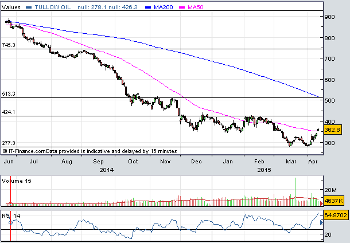Buy Tullow Oil after upgrade
14th April 2015 13:21
mega-bid for is widely believed to have fired the starting gun for another round of oil industry consolidation. It's the mid-to-small-cap players that look most vulnerable this time, but even without a takeover premium, analysts at Citi think £3 billion is worth a look.
In fact, the broker is so impressed with the quality and defensiveness of Tullow's portfolio it has upgraded its rating on the shares to 'buy' from 'neutral' and lifted its price target from 406p to 433p. That's a 19% premium to the current market price of 363p.
"We believe the concerns around Tullow's balance sheet and timing of the TEN development [off the coast of Ghana] are more than discounted in the current valuation with the shares trading below our core NAV [net asset value] of 354p (assuming a long-term oil price of US$75/bbl and 10% discount rate)," writes Citi analyst Michael Alsford in a 27-page note.
"Our core NAV includes no value for exploration/appraisal upside in Tullow's portfolio and risks by c. 15% its non-sanctioned developments (Kenya/Uganda)."
Tullow's production growth out to 2018 will largely be driven by Ghana - TEN and the world-class Jubilee field - says Citi. It forecasts a 12% compound annual growth rate (CAGR) for exploration and production (E&P) working interest output from about 75,000 barrels of oil equivalent per day (boe/d) in 2014 to 119,000 boe/d four years later.

(click to enlarge)
Although delays to the gas compression project onshore Ghana have held up plateau production (120,000 b/d gross) from Jubilee, Citi expects plateau production in 2016. It could reach 130,000 b/d the following year.
Meanwhile, the TEN development - based around a floating production, storage and offloading (FPSO) facility with a production capacity of 80,000 b/d - is targeting first oil in mid-2016.
"Overall, we see Tullow's E&P growth as well positioned on the cost curve, with an average oil price breakeven of c. US$45/bbl," writes Citi, which also believes that borrowing levels peak next year at $4.35 billion ($3.1 billion at end of 2014), with gearing (net debt/equity) at about 100%. Gearing should fall as TEN ramps up.
Selling down high equity stakes in developments in Uganda and Kenya over the next 12-18 months could even bring forward the value from these projects and see Tullow de-lever more quickly.
Citi also plays down the threat from a maritime boundary dispute between Ghana and Cote d'Ivoire. "Our base case assumes that the risk of a suspension of operations in the disputed area (which includes the TEN project) is low, as it would be detrimental to all parties." Final resolution on the dispute may not come until the end of 2017, although a court decision on whether operations should be temporarily suspended there is due this month.
In terms of valuation, Citi uses a base case NAV of 481p, which assumes oil at $61 a barrel in 2015, $70 next year, then long-term $75, and an exchange rate of $1.50 to the pound. "We set our target price at £4.33, a 10% discount to our base case NAV; this is less than the sector average discount of 30% due to the quality of Tullow's asset portfolio."
This article is for information and discussion purposes only and does not form a recommendation to invest or otherwise. The value of an investment may fall. The investments referred to in this article may not be suitable for all investors, and if in doubt, an investor should seek advice from a qualified investment adviser.
Editor's Picks